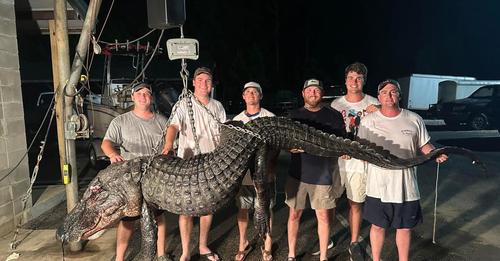Six friends on an alligator hunt caught one big brute of a reptile during Alabama's two-weekend-long alligator hunting season.
Taylor Douglas and his friends hauled in a 524-pound gator from Mobile Bay, in Alabama's coastal zone, around 2 a.m. on Aug. 13.
"We knew we were on a big one but no one knew exactly how big he was until he first surfaced out of the water," Douglas told local news network WKRG. "Then everyone quickly realized the situation and it was all hands on deck."
The big male alligator measured 12 feet, 9 inches long, as confirmed by Alabama Wildlife and Freshwater Fisheries Division's Marianne Gauldin to WKRG in Mobile. Gauldin told the station the 500-plus-pounder was the largest alligator of the season.
Douglas and his crew had never fought an alligator that large.
"It took us roughly one hour from the time he was hooked until the time he was dispatched," Douglas said. "The biggest struggle was trying to get his body in the boat. Three Game Wardens were on a boat next to us and got to watch the entire fight."
There are five distinct alligator management zones in Alabama: the coastal zone, the southwest zone, the west central zone, the southeast zone and the Lake Eufaula zone. All seasons begin in early August; the longest of them, the Lake Eufaula management zone season, lasts into mid-October.
According to the Alabama Department of Conservation and Natural Resources, the state's alligator population has grown so much that it poses a nuisance in some areas—and, while inconvenient, represents a conservation success story for the Southern state.
The American alligator (Alligator mississippiensis) was hunted to near extinction during the 1920s, '30s, and '40s. No regulations existed in those days to limit the number of alligators harvested, which were prized for both meat and leather.
In 1938, Alabama was the first state to protect alligators by outlawing unlimited harvests. Other states soon followed; and, in 1967, the U.S. Fish and Wildlife Service placed the American alligator on the endangered species list. By 1987, the species was removed from the endangered species list, and the alligator population has continued to grow. However, it remains a federally protected species.
Implementing a small-scale, regulated alligator hunt in Alabama is an important step in the state's plan to control populations and better manage this unique, semi-aquatic predator reptile.
Only Alabama residents and lifetime hunting license holders over age 16 can apply for an alligator harvest permit, according to state regulations.
READ MORE: How to Survive an Alligator Attack: Quick Safety Tips to Remember




